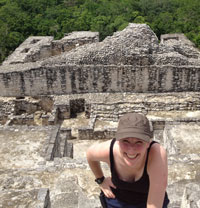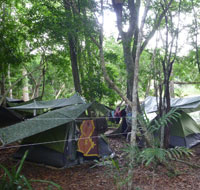The Apprentice
Post date: 04/09/2013 | Time to read article: 4 minsThe information within this article was correct at the time of publishing. Last updated 18/05/2020
 New GP Dr Laura Davison took a career break to become a jungle GP in Mexico. Here’s what happened
New GP Dr Laura Davison took a career break to become a jungle GP in Mexico. Here’s what happened
This issue’s Apprentice correspondence comes to you from the gloriously sunny white beach of Cancun. This information is important for two reasons. One, I am emphasising the importance of rest and relaxation time for you my fellow GPs, and two, I’ve just spent the past four weeks in the Mexican jungle as an expedition doctor for a wildlife conservation charity, and it seemed rude not to pop by the beach on the way home.
As a new locum GP, this is the first time in the six years post-qualification that I’ve been in charge of my own rota. I now decide where and when I work, so, itching to explore this new-found freedom and try something different to spice up the monotony that can be the standard three-hour surgery session, I signed up to be an expedition medic with Operation Wallacea in Mexico.
So here I am, sat on a beach, at the end of my month of being a jungle GP, having survived sleeping in a hammock, jumping over jumping spiders, dodging stinging scorpions and being massacred by mosquitos. It’s been a fantastic break from UK practice, but it’s not been a holiday particularly. Although I really only did 15 minutes of actual medicine each day, you are the sole health and safety officer on duty and ready for action 24/7 for a month.
Nagging people about footwear, no running, no touching wildlife, no climbing, washing their hands, keeping hydrated and so on, is very tiring. Much like cruise-ship medicine, the doctor also has a social role and needs to be engaged and approachable at all times and be continually monitoring the expedition party members for early health warnings. There were regular updates and presentations on current health issues and routine supply stock checks; this is not the job for the GP who likes time to themselves or wants to “get away from it all”.

It’s very much a “wellness officer” role rather than a medic, providing pastoral care as well as the odd dressing or pharmaceutical supply. It’s certainly not all broken limbs and snake bites, as the Bear Grylls types out there might be hoping for. It’s the most mundane medicine you’ll perform and a good expedition should never experience anything drastic to call you into super-doc action. The slowness of pace meant I learnt a lot about the wait and watch approach – being on site 24 hours a day, every day, means you can monitor everything. I had time to experiment with the best treatments for bites – toothpaste! Who knew? – and how to create improvised dressings with socks and duct tape. A sock also makes an excellent jungle coffee filter too, you know. A new skill for me was tick-removal and I found it always supremely satisfying to successfully remove one of the little devils. Every high five from a tick-victim was a joy. My crowning moment was having to remove my own first tick from my bum cheek. Left handed. No one high fived me after that though, the group felt that now I was just showing off.
The bonus of expedition work is nothing to do with the medicine. I got to see wildlife I’d never even heard of, sit atop a 2,000-year-old Mayan temple in a thunderstorm and make some fabulously interesting friends.
Every expedition is different; they incorporate different environments, for different aims with different clientele, so job requirements will vary. The company I went with needed you to be past the F2 stage and have some emergency experience.
It’s not for everyone and I would strongly advise you to consider your personality type and how it matches the expedition before you jump into this niche field. I found a laidback spirit and the acceptance that the provision of kit and services is going to be below your comfortable, clean, well-stocked GP surgery level. You need to be inventive and adaptable with your equipment and supplies.
"The bonus of expedition work is nothing to do with the medicine. I got to see wildlife I’d never even heard of, sit atop a 2,000-year-old Mayan temple in a thunderstorm and make some fabulously interesting friends"
It’s a great aid to your own happiness and a fantastic addition to the expedition as a whole if you’re social and approachable, as 90% of your day is spent with your potential patients in a non-medical capacity. If you’re unwilling to meet and greet, you will find yourself bored and lonely very quickly. The age of your group is a consideration you need to take on before accepting a position as it will dictate how much of a pastoral role you will play. We had a lot of teenagers on our trip doing biology field trips. They were fantastic fun, but I did have to be their mum for the week.
Finally, if you’re looking for an expedition to apply for, actually be interested in what the expedition is about, else you are going to be mind-numbingly bored. You’ll really only do about 15 minutes of medicine per day and if you aren’t bothered by the project aims then there is very little else with which you will be able to fill the rest of the 23 hours and 45 minutes. I went out with the bat, monkey and bird teams regularly and saw some phenomenal animals. I became a tour guide for the Mayan ruins and even got involved with camp management, including toilet cleaning. This filled the days nicely.
I’ve learnt a lot, developed new skills, made some fabulous friends and loved it all, but next time I will pick somewhere with fewer spiders.
